Contents
What are so-called probiotics?Myths & factsWhat makes a good microculture preparation?Our test resultsFrom fatigue to digestive problems to a weak immune system - there is hardly an ailment for which a probiotic product is not being advertised. They come in all shapes, colours and, of course, price ranges. But what are those products actually, what are they intended for and - most importantly - what is the truth behind the often generous promises?
Summary
- Scientists worldwide agree: the gut and the bacteria living in it have a major influence on the entire body.
- For this reason, so-called probiotics are becoming increasingly popular.
- Despite their diversity, there are some fundamental quality criteria that we have used to test popular products.
Go directly to the test
What are so-called probiotics?
Probiotics are products containing living microorganisms that colonise the intestine and are intended to "rehabilitate" the intestinal microbiome. This is why the term "intestinal reorganisation" is often used in this context.
A health trend that can be observed more and more frequently. But what is it for?
First of all, the basics: our gut is actually an incredibly complex marvel, as it not only ensures that the nutrients we absorb through food reach the right places in the body, but is also responsible for around 80% of our body's own immune reactions.
It is also connected to other organ systems. The gut-brain axis is currently a particular focus of scientific research. Research into this connection between the gut microbiome and the brain has found evidence that the gut could have an impact on certain brain functions.
So it's no wonder that it is now considered to be the centre of our well-being - or of our discomfort if its function is impaired. A balanced microbiome is a crucial condition for our gut to be able to fulfil its tasks properly. The microbiome refers to the entirety of microorganisms in the gut.
These form a complex ecosystem, similar to a tropical rainforest. It too can only thrive if all the organisms living in it are in harmony with each other. However, if, for example, one plant species gets out of hand, this can disrupt the entire balance.
These factors can also be transferred to the intestinal microbiome, which according to current research consists of up to 100 trillion bacteria!
The bacteria can be divided into different strains - just as the plant species in the example above each have different properties and tasks. Unfavourable external influences, such as an unbalanced diet, stress or certain medications, can lead to an increase in some bacterial strains and a reduction in others or even an overall decrease in the number of intestinal bacteria.
The resulting imbalance is also known scientifically as dysbiosis and is now associated with many health problems. This is also confirmed by micronutrient expert Martin Gschwender:
'The bacteria in our gut not only affect the gut itself, but our entire body. Researchers have discovered links to our immune system, to other organs, to fatigue and tiredness, and even to obesity, skin diseases and allergies.'
Martin Gschwender, micronutrient expert

Not obvious at first glance: Dysbiosis can also be behind symptoms of exhaustion.
This is exactly where the so-called probiotics want to start.
The basic idea: specific intestinal bacteria should be supplied in a targeted manner, thereby rebalancing the intestinal microbiome and optimally supporting the intestine in the fulfilment of its tasks - for all-round greater well-being. That sounds very plausible at first - but can it really work?
Myths and facts about probiotics
As with all hype, numerous myths and claims have quickly formed around the topic of probiotics, making it difficult to choose the right preparation. This article takes a closer look at the most widespread myths:
Myth 1: Probiotic equals probiotic
Fact 1: We can answer this myth with a clear "false".
The various preparations we analysed differed greatly from one another. This was particularly evident, for example, in the number of bacterial strains analysed as well as in the dosage and packaging. All of these criteria ultimately determine the quality of a product.
Myth 2: Probiotics do not work because they are broken down by stomach acid
Fact 2: Not true.
In fact, some bacteria, especially bifido- and lactic acid bacteria, are insensitive to stomach acid. Even if this may sound surprising at first, it is logical - after all, the bacteria already present in our intestines, which we have ingested through our diet, have also taken this route and arrived alive in our intestines - without the much-publicised enteric-coated capsules and similar mumbo-jumbo.
Myth 3: Probiotics provide hardly any more bacteria than our conventional diet
Fact 3: This myth is also rather untrue.
On the one hand, there are certainly foods with probiotic properties; yoghurt, for example, but also sauerkraut and the currently popular Korean kimchi contain lactic acid bacteria. However, these are usually only a few different strains. On the other hand, it is important to note that many products are pasteurised, which kills the bacteria (both good and bad).
Incidentally, the amount of bacteria also differs considerably. Good microculture preparations contain at least 20 billion colony-forming units (CFU). The same amount is contained in around 25 kilograms (!) of yoghurt, which is far more than we consume on a daily basis.
Myth 4: A good probiotic is expensive
Fact 4: Rather not true.
Probiotics are available in all price ranges. Of course, everyone is happy when they can save money, especially when it comes to products that are to be taken on a daily and long-term basis. However, this should not be forgotten: Good basic research, careful selection of strains, a high dosage and appropriate packaging have their price. Even if we do not want to devalue cheap products across the board, cheap offers should be treated with caution for the reasons mentioned.

Myth 5: A good probiotic works immediately!
Fact 5: Rather no.
The idea of so-called probiotics is to support the intestinal microbiome in the long term. Considering how many bacteria our intestines contain, it is clear that great successes can hardly be achieved overnight.
Although some people notice slight changes after the first week (especially in the area of digestion), micronutrient specialists recommend taking the product for at least 2 to 3 months.
What makes a probiotic and which products fulfil our requirements?
In the course of their research, the expert team identified 5 key quality features and then tested 5 products for these features.
Quality characteristic 1: The number of bacterial strains contained
A good probiotic endeavours to come as close as possible to the composition of a balanced human intestinal microbiome. In principle, it should mimic a faecal transplant - but without the disgust factor. However, a human gut does not only harbour 3 to 10 different bacterial strains, but far more. Accordingly, it should contain at least 50 different strains.1
Quality characteristic 2: The dosage of colony-forming units
Although figures such as 2, 4 or 10 billion CFU sound very impressive at first, current research shows that a healthy gut contains 10 to 100 trillion bacteria. Preparations with too low a dosage are therefore not significant enough to actually bring about a change. Our expert recommends products with at least 20 billion CFU.2
Quality characteristic 3: Support for the intestinal mucosa
In order for the microcultures to colonise the intestine and do their work there, they need a suitable breeding ground: an intact intestinal mucosa. The problem is that the intestinal mucosa is often damaged, especially in the case of intestinal problems, which makes it difficult for the good bacteria to colonise.
In addition to bacteria, probiotics should therefore also contain substances that support the intestinal mucosa, such as the B vitamins niacin and biotin. A product containing at least two such substances will be awarded 100 points, whereas products containing one such substance will be awarded 50 points.
Quality characteristic 4: The stability of the packaging
The bacteria in a probiotic are put into a kind of hibernation during production by freeze-drying. When they come into contact with moisture, they "wake up". If suitable food sources are then available - which is the case in the intestine - the bacteria thrive. The problem is that many forms of packaging do not adequately protect the preparations from moisture.
For example, if capsules are not packaged individually but together in a plastic container or jar, the products come into contact with air or moisture every time they are opened. As a result, the bacteria can awaken too early, but then find no food in the capsule - and starve to death.
Plastic packaging is made even more difficult by the fact that the material does not completely keep out moisture: Tiny amounts of moisture can pass through the packaging. In these cases, it is therefore not uncommon for all the bacteria contained in the packaging to be dead by the time it is ingested.
Aluminium-aluminium blister packs, in which each capsule is individually embedded in an aluminium chamber and is therefore optimally protected, are regarded as the packaging gold standard.
Products with this kind of packaging will therefore receive full marks. In contrast, plastic blisters, while still offering single-unit packaging, are made from inferior materials. As a result, products with plastic packaging will only receive 75 points.
While the properties of glass are superior to those of plastic, glass bottles usually contain a greater number of capsules which leads to them being in contact with air and therefore moisture with every opening. Glass bottles therefore are only "worth" 50 points. Plastic bottles on the other hand combine the disadvantages of glass bottles and plastic blisters and can therefore only be awarded 25 points.

Aluminium-aluminium blisters protect bacteria in their capsules optimally from moisture.
Quality characteristic 5: Quality standards and certification
Unfortunately, there are hardly any legal requirements for the production of probiotics. For this reason, many manufacturers advertise with certifications - but these often only cover a minimum standard. It is therefore particularly important to take a closer look at the certifications advertised.
Production according to GMP (Good Manufacturing Practice), the pharmaceutical grade production standard, ensures the highest standard. Only with GMP-certified manufacturers can consumers be sure that their products have been manufactured to this particularly high standard, which is why products with this certificate will be awarded 100 points, whereas products missing it will receive zero points.
Note: The term ‘probiotic’ is widely used, but may not be used to advertise a corresponding product.
The editorial team has instead opted for the more appropriate term ‘microculture preparation’.
Based on these criteria, we analysed 5 products and came to the following conclusion:

Kijimea K53 Advance
Advantages
The manufacturer is known in medical circles for its research and innovations.
Just one easy-to-swallow capsule covers the daily dose.
The product is gluten-, fructose- and lactose-free and free from additives, preservatives, flavourings and sweeteners.
Disadvantages
The manufacturer recommends using the product over a longer stretch of time.
Kijimea K53 Advance is manufactured by the German brand SYNformulas, which is well established in bacterial research. Thanks to its own scientific research, which has even been published in the world-renowned specialist journal "The Lancet", this company enjoys a great reputation among medical experts. This is also evident when taking a closer look at the product: with 53 bacterial strains, K53 Advance offers the greatest variety.
In addition, the product has one of the highest dosages (20 billion CFU) and also contains both biotin and niacin to support the intestinal mucosa. The packaging in an aluminium/aluminium blister corresponds to the gold standard, as it optimally protects each capsule from air and moisture from production to consumption.
In addition, both the manufacturing process and the facilities on which the preparation is produced are GMP-certified in accordance with the strict pharmaceutical grade standard.
What particularly caught our eye during our research on this product are the numerous extremely positive customer reviews that underline our own impression of the product. Here are some examples:
Andrew B.
'I'm thrilled with the positive change. I highly recommend it to everyone. From fast shipping to fast results, it's GREAT!'
Fiona G.
'I've been looking for a probiotic that is produced and packaged to the highest scientific standards for a long time. If you look into it a little, it quickly becomes clear that Kijimea simply has a different quality standard than others – I'm super satisfied!!!'
Joanne M.
'I've been taking the product for a few weeks now and I already feel much better. I've also given it to a friend.'
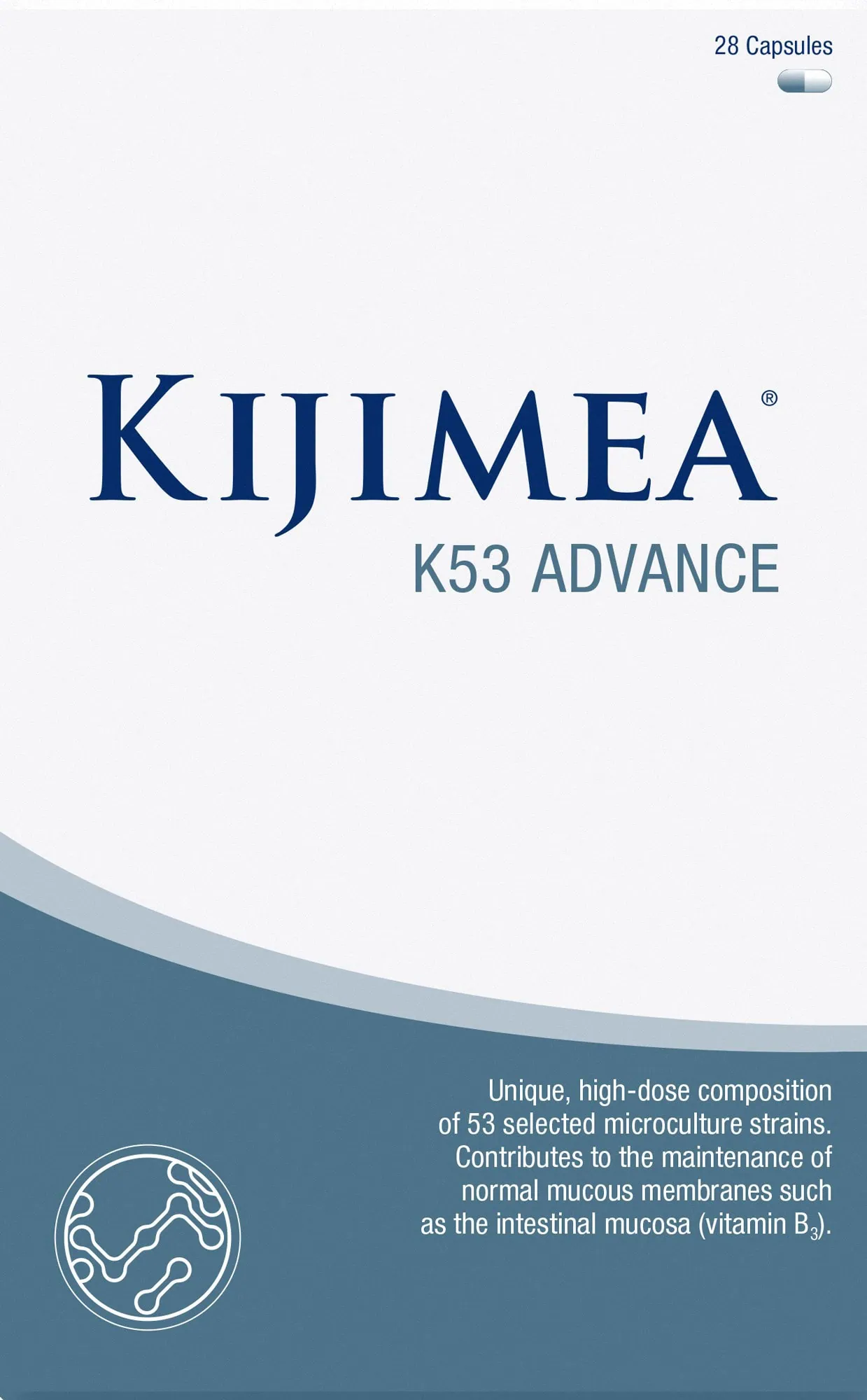
Kijimea K53 Advance convinces across the board and therefore deservedly takes first place with 95 points.
Particularly impressive: the product contains 53 different bacterial strains, more than ten times as many as the product in second place.
Synerbio Daily High Strength
Advantages
Manufacturer mentions strain specificity.
High dosage.
Disadvantages
With four different bacterial strains, the diversity is too low.
Contains no ingredients to strengthen the intestinal mucosa.
The capsules from Synerbio share the high dosage of the test winner - but the 20 billion CFU are distributed across four instead of 53 different strains. Compared to the diversity of the human microbiome, this is a rather small number – however, the manufacturer laudably provides the strain specification.
Furthermore, the manufacturer did not add ingredients that specifically address the intestinal mucosa. On the other hand, the GMP certification, which promises compliance with high production standards, should be emphasised positively.
With FOS and Inulin, the product contains two different prebiotics, which serve as food for the bacteria, but it should be mentioned that Inulin can lead to flatulence. Although the packaging in the glass bottle offers better protection than a plastic container, it does not change the problem that air and thus moisture can get into the packaging every time it is opened.
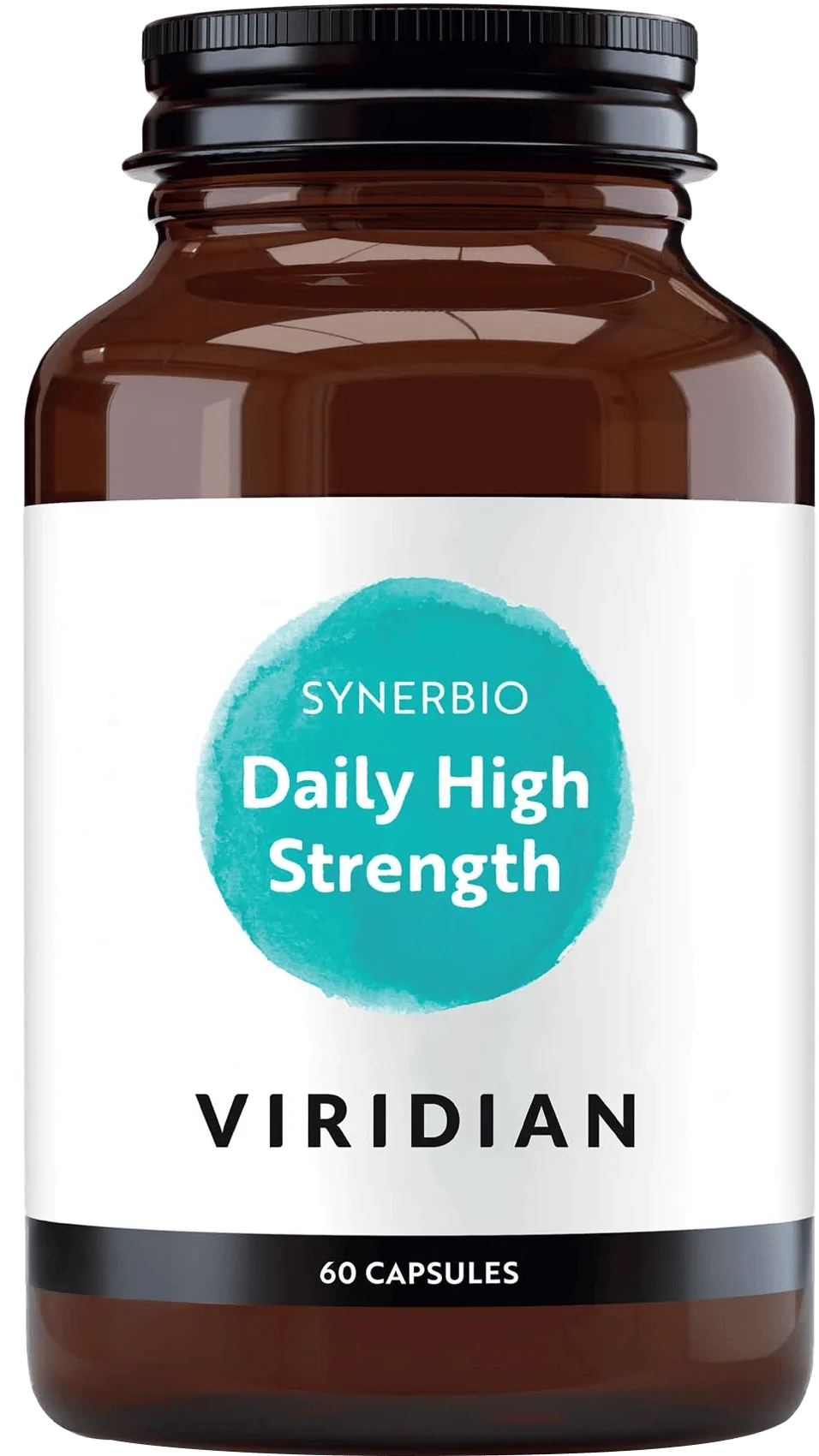
All in all, Daily High Strength scored 45 points, securing second place behind the test winner Kijimea K53 Advance.
Although the product offers a sufficiently high dosage, the diversity of 4 strains is much lower than many of its competitors.
Buy Synerbio Daily High Strength online
luvbiotics Advanced Formula Gut Health
Advantages
Mention of the strain specificity.
The capsules are vegan, gluten-free and free from artificial flavourings and preservatives.
Disadvantages
The dosage is too low.
The manufacturer does not have GMP certification.
At first glance, luvbiotics looks very promising thanks to their 16 bacterial strains - and thus the second highest diversity after the test winner – even with the packaging in a plastic blister. Even though an aluminium-aluminium blister promises even better protection than a plastic blister, the individual packaging still protects the contents far better than a plastic container.
However, there are also significant disadvantages: First of all, the product only contains the low dosage of 8.2 billion CFU per capsule - a far cry from the recommended 20 billion CFU. GMP certification is also lacking, as are substances to support the intestinal mucosa. However, the addition of zinc and calcium, which is important for the function of the digestive enzymes, should be mentioned positively here.
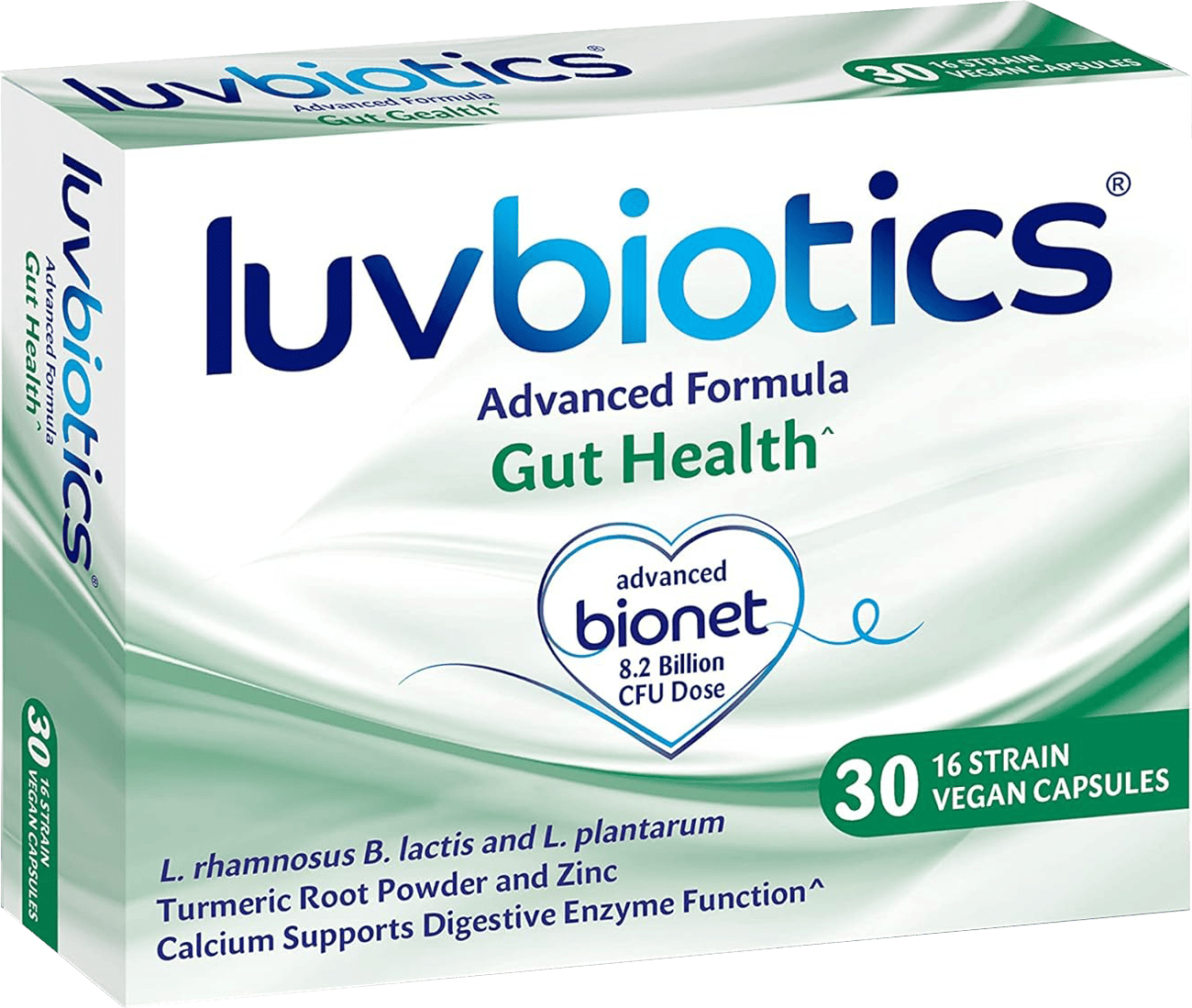
With 30 points, luvbiotics came in 3rd.
Although the product contains 16 different strains, the dosage is too low.
Buy luvbiotics Advanced Formula Gut Health online
Jamieson Chewable Probiotic
Advantages
Pleasant to consume as the tablets can be chewed.
Mentions strain specificity.
Disadvantages
Contains the lowest dosage of all products tested.
Contains sugar.
Chewable Probiotic is the only product that is not swallowed in capsule form but consumed in the form of chewable tablets. This may be an advantage for people who have difficulty swallowing capsules, but this form brings with it another problem: The flavour becomes relevant. For this reason, the manufacturer has added natural strawberry flavouring, but also sugar.
The product contains five different bacterial strains in the lowest dosage of 2 billion CFU among the products compared here. The manufacturer commendably states the strain specificity, though. The packaging in the plastic container is not ideal, as it does not adequately protect the contents from penetrating air and moisture. Ingredients that are specifically intended to support the intestinal mucosa are not included. The GMP certification can be seen as a real plus point, as it promises high production standards.
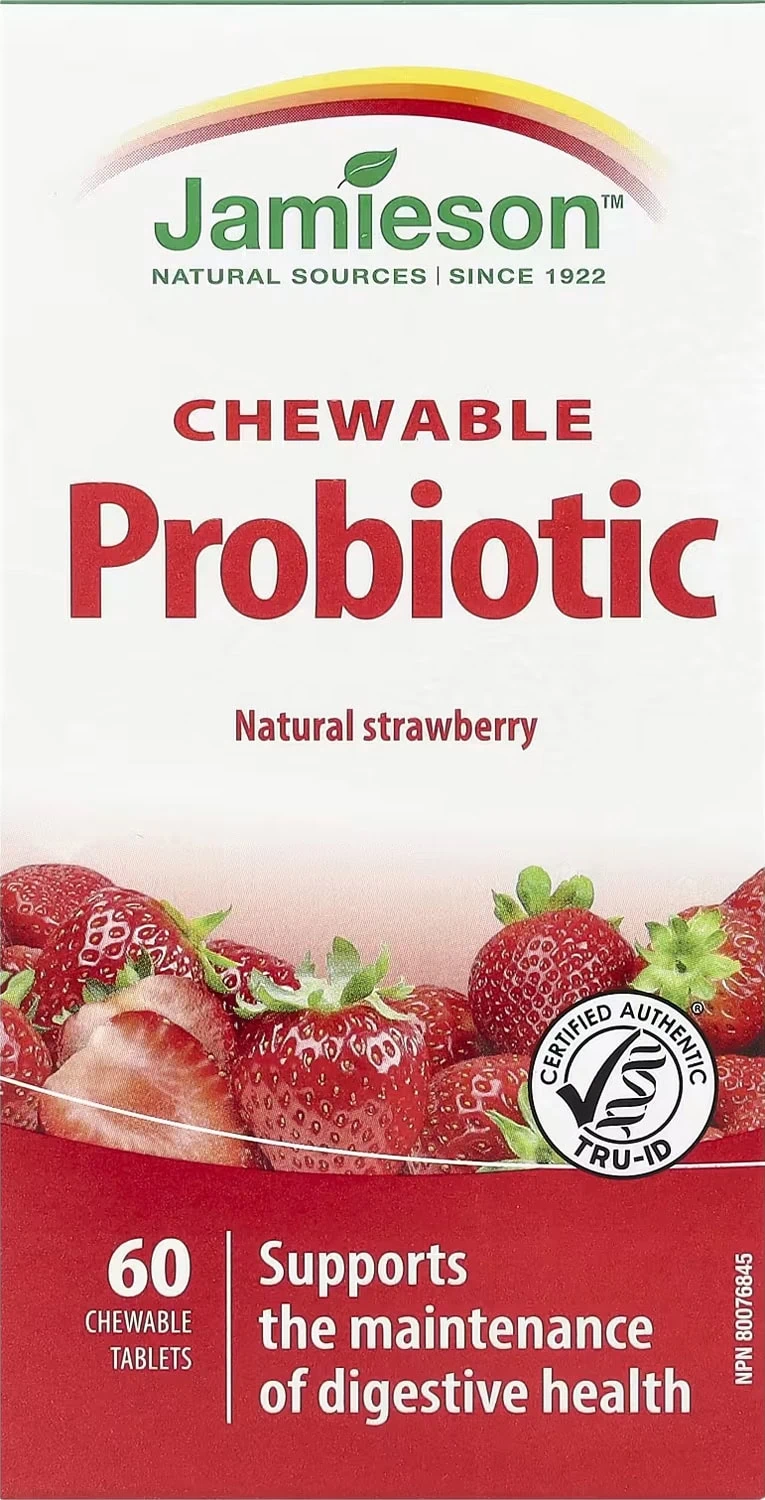
The chewable probiotics achieve a total of only 25 points and thus rank fourth.
Although they may be able to convince one or two strawberry fans thanks to their strawberry-flavoured chewable form, both the diversity and dosage are too low to achieve a real effect on the gut microbiome.
Buy Jamieson Chewable Probiotic online
Healthy Mood Natural High Strength Probiotic Max
Advantages
At 20 billion CFU, the dosage is high.
Disadvantages
One bacterial strain is not sufficient for such a preparation.
The packaging is not ideal.
The capsules from Healthy Mood do not prove sufficient with regard to several of the key qualities a probiotic should have. The only highlight is the dosage of 20 billion CFU per capsule. On the other hand, the product contains a single bacterial strain, but does not mention the strain specificity. Ingredients that are explicitly intended to support the intestinal mucosa are absent, as is GMP certification.
The product can be purchased either in a bag or in a plastic container; neither is ideal, as neither is suitable for optimally protecting the contents from penetrating air and moisture.
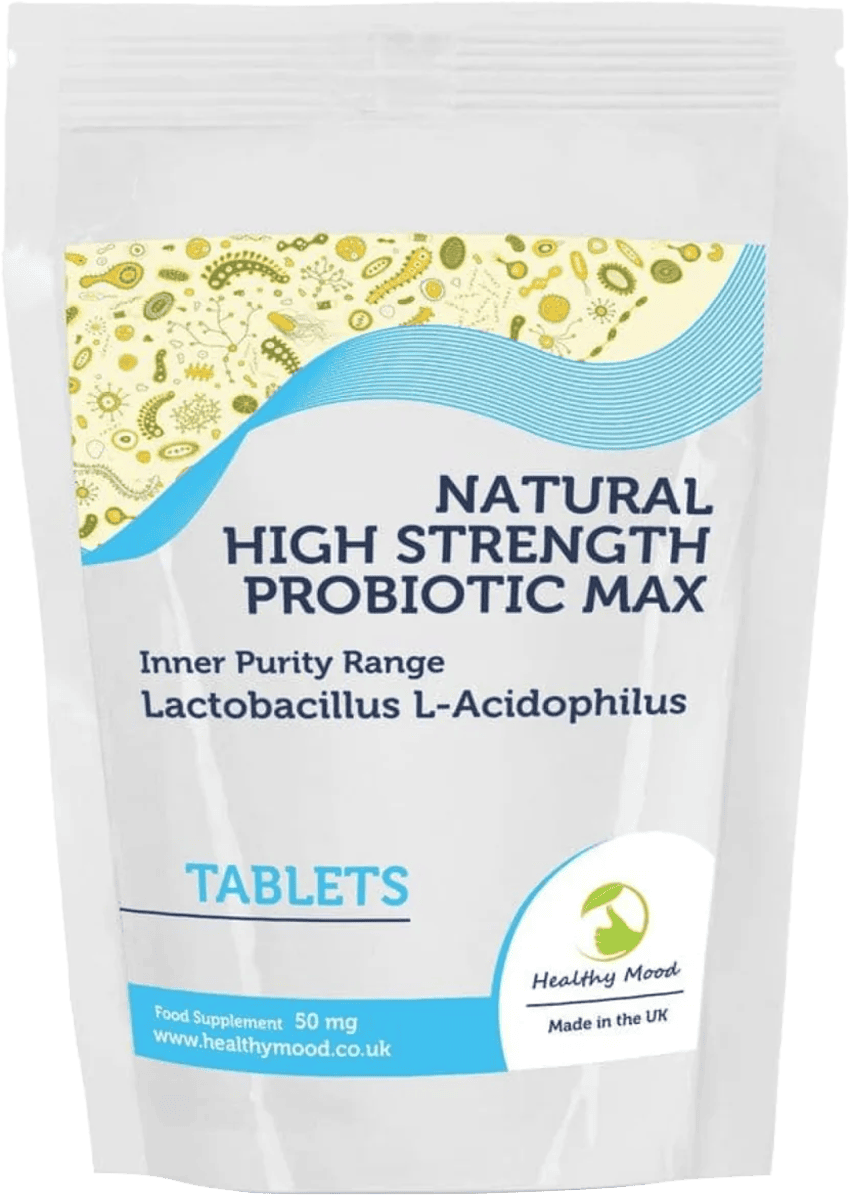
With a mere 20 points, the capsules from Healthy Mood came in last.
Although they scored in the higher range for dosage, they disappointed in all other areas.
Buy Healthy Mood Natural High Strength Probiotic Max online
Conclusion
The intestine is currently the focus of medical research and rightly so! The major influence of this organ and its bacterial inhabitants on many areas of health can already be surmised. At the same time, however, it is becoming apparent that the stressful lifestyle that is widespread today can have a negative impact on our gut microbiome.
Microculture preparations can then be a useful supplement in many cases. However, a closer look reveals that there are enormous differences in quality between the products on the market.
It is therefore particularly important to obtain comprehensive information before making a purchase.
1Basis of grading number of strains:
- 100 points ≥ 51 strains
- 75 points ≥ 31 strains
- 50 points ≥ 16 strains
- 25 points ≥ 6 strains
- 0 points < 6 strains
2Basis of grading of daily dosage:
- 100 points ≥ 30 billion CFU/daily intake
- 75 points ≥ 20 billion CFU/daily intake
- 50 points ≥ 10 billion CFU/daily intake
- 25 points ≥ 5 billion CFU/daily intake
- 0 points < 5 billion CFU/daily intake
Kim, Sangman M et al. "Fecal microbiota transplant rescues mice from human pathogen mediated sepsis by restoring systemic immunity." Nature communications vol. 11,1 2354. 11 May. 2020, doi:10.1038/s41467-020-15545-w
Turnbaugh, P et al. An obesity-associated gut microbiome with increased capacity for energy harvest. Nature 444, 1027-1031 (2006). https://doi.org/10.1038/nature05414
Hua, X., Goedert, J. J., Pu, A., Yu, G., & Shi, J. (2015). Allergy associations with the adult fecal microbiota: Analysis of the American Gut Project. EBioMedicine, 3, 172-179. https://doi.org/10.1016/j.ebiom.2015.11.038
Frémont, Marc et al. "High-throughput 16S rRNA gene sequencing reveals alterations of intestinal microbiota in myalgic encephalomyelitis/chronic fatigue syndrome patients." Anaerobe vol. 22 (2013): 50-6. doi:10.1016/j.anaerobe.2013.06.002
The information on this page does not constitute medical advice and should not be considered as such. Consult your doctor before changing your regular medical care. This product is not intended to diagnose, treat, cure or prevent any disease. The effect depends on individual factors. The images of those affected are based on real people whose names have been changed.
As an Amazon Associate, we earn from qualifying sales.
